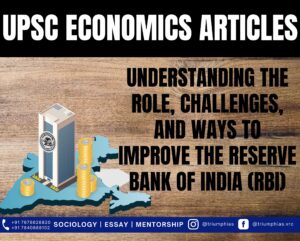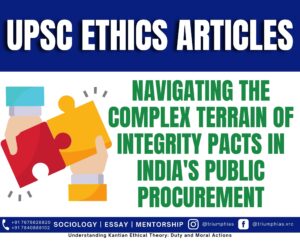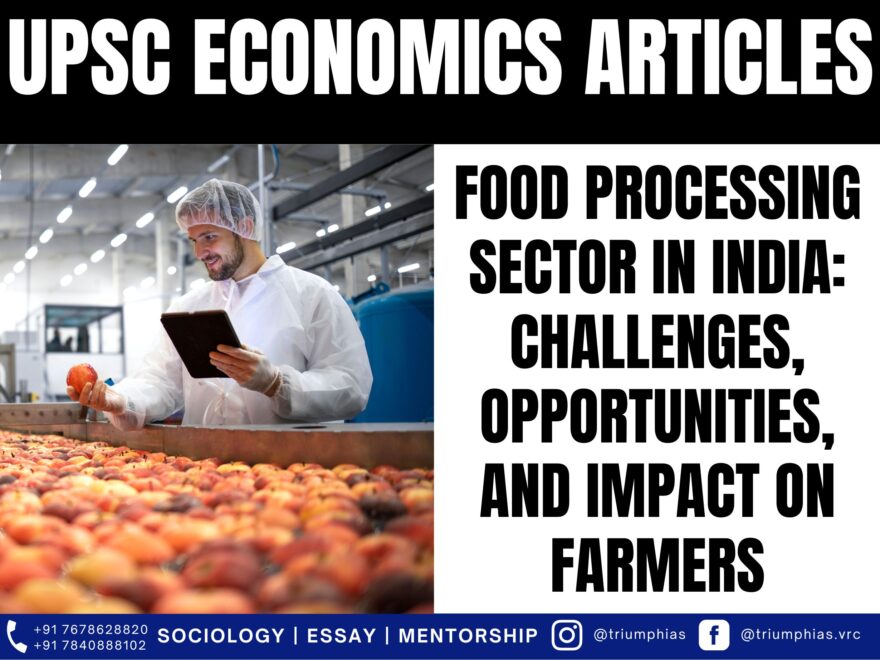Food Processing Sector in India
(Relevant for Economics Section of General Studies Paper Prelims/Mains)

Food processing
Food processing typically encompasses fundamental food preparation, transforming one food product into another form, and employing preservation and packaging methods.
Given India’s status as an agrarian economy, it possesses an inherent advantage in the realm of food processing industries (FPI). As the demand for agricultural products increases, there will be a corresponding uptick in the prices offered to farmers, resulting in augmented incomes.
Challenges Faced by Food Processing Industry in India
- Supply-Side Obstacles: The division of land into small and scattered plots results in limited farm productivity, leaving farmers with a meager and dispersed surplus for the market.
- Demand-Side Constraints: The demand for processed food is predominantly concentrated in India’s urban areas.
- Infrastructure Challenges: Inadequate mechanization, high seasonality, perishability, and a lack of efficient intermediaries in the supply chain contribute to a shortage of raw materials. Additionally, the absence of all-weather roads and connectivity leads to irregular supply, resulting in over 30% of farm produce being lost due to insufficient infrastructure.
- Informalization in the Food Processing Industry: The food processing industry exhibits a significant presence of unorganized segments, accounting for approximately 75% across all product categories. This informal structure introduces inefficiencies into the existing production system, which subsequently hinders food processing and its export potential.
- Regulatory Environment Deficiencies: Multiple laws, administered by different ministries and departments, govern food safety and packaging. The multitude of regulations and administrative delays create inconsistencies in food safety standards and guidelines.
- Sanitary and Phytosanitary (SPS) Measures: Stringent SPS measures imposed by developed countries also act as barriers to the export of processed foods.
Opportunities Associated with Food Processing Industries
- Employment-Generating Sector: The Food Processing Industry (FPI) holds immense significance by fostering crucial linkages and synergies between the two main pillars of the economy, namely agriculture and industry. Consequently, it offers both direct and indirect employment opportunities.
- Ensuring Nutritional Security: When fortified with essential vitamins and minerals, processed foods have the potential to bridge the nutritional gap within the population.
- Boosting Trade and Foreign Exchange Earnings: It serves as a vital source of foreign exchange earnings. For instance, Indian Basmati rice enjoys high demand in Middle Eastern nations.
- Mitigating Food Inflation: Food processing extends the shelf life of products, ensuring a continuous supply that aligns with demand, thus helping control food inflation. For example, frozen Safal peas are available year-round.
Food Processing Industry & Farmers’ Income Correlation
- High-Yield Varieties (HYV) of Food: Currently, Indian agriculture is primarily focused on cereal production. However, the next phase of income growth for farmers hinges on transitioning to high-yield varieties (HYV) of food such as horticulture and dairy products.
- Nonetheless, one challenge associated with HYV is their limited shelf life. This is where the Food Processing Industry (FPI) can step in, ultimately bolstering farmers’ income.
- Increasing Demand for Agricultural Products: Rapid urbanization in India is driving up the demand for processed foods. Additionally, while India stands as one of the world’s largest food producers, less than 10% of its production undergoes processing. Given this scenario, there is substantial potential for an increased demand for processed foods, leading to higher incomes for farmers.
- Tackling Rural Unemployment: By bridging agriculture and industry, the FPI can help alleviate the issue of hidden unemployment, which currently hampers Indian agriculture’s productivity. Being a labor-intensive sector, the food processing industry will create localized employment opportunities, reducing the pressure on regions that experience significant outmigration.
Food processing provides an opportunity to utilize excess production efficiently, ensuring food & nutritional security and supporting farmers. Thus, food processing has become an integral part of the food supply chain in the global economy. India being an agrarian dominated country must leverage its potential in the Food Processing Industry.
Sample Question for UPSC Sociology Optional Paper:
-
Question: What are the supply-side challenges faced by the food processing industry in India?
Answer: Supply-side challenges include limited farm productivity due to small and scattered land plots and inadequate infrastructure. -
Question: How does the food processing industry contribute to farmers’ income in India?
Answer: The industry can increase farmers’ income by processing high-yield varieties of food, reducing post-harvest losses, and creating employment opportunities in rural areas. -
Question: What role does the food processing sector play in mitigating food inflation?
Answer: By extending the shelf life of products and ensuring a continuous supply, the industry helps control food inflation by aligning supply with demand. - Question: Why is the informalization of the food processing industry a concern?
Answer: The presence of unorganized segments introduces inefficiencies into the production system, hindering food processing and export potential. -
Question: How can the food processing industry bridge the nutritional gap within the population?
Answer: Fortifying processed foods with essential vitamins and minerals can help address nutritional deficiencies, ensuring nutritional security.
Related Blogs …
 |
 |
To master these intricacies and fare well in the Sociology Optional Syllabus, aspiring sociologists might benefit from guidance by the Best Sociology Optional Teacher and participation in the Best Sociology Optional Coaching. These avenues provide comprehensive assistance, ensuring a solid understanding of sociology’s diverse methodologies and techniques.
Food Processing Sector, Challenges, Opportunities, Farmers’ Income, Supply-Side Obstacles, Demand-Side Constraints, Infrastructure, Regulatory Environment, Employment Generation, Nutritional Security, Foreign Exchange Earnings, Food Inflation, High-Yield Varieties, Rural Unemployment, Agrarian Economy

Choose The Best Sociology Optional Teacher for IAS Preparation?
At the beginning of the journey for Civil Services Examination preparation, many students face a pivotal decision – selecting their optional subject. Questions such as “which optional subject is the best?” and “which optional subject is the most scoring?” frequently come to mind. Choosing the right optional subject, like choosing the best sociology optional teacher, is a subjective yet vital step that requires a thoughtful decision based on facts. A misstep in this crucial decision can indeed prove disastrous.
Ever since the exam pattern was revamped in 2013, the UPSC has eliminated the need for a second optional subject. Now, candidates have to choose only one optional subject for the UPSC Mains, which has two papers of 250 marks each. One of the compelling choices for many has been the sociology optional. However, it’s strongly advised to decide on your optional subject for mains well ahead of time to get sufficient time to complete the syllabus. After all, most students score similarly in General Studies Papers; it’s the score in the optional subject & essay that contributes significantly to the final selection.
“A sound strategy does not rely solely on the popular
Opinion of toppers or famous YouTubers cum teachers.”
It requires understanding one’s ability, interest, and the relevance of the subject, not just for the exam but also for life in general. Hence, when selecting the best sociology teacher, one must consider the usefulness of sociology optional coaching in General Studies, Essay, and Personality Test.
The choice of the optional subject should be based on objective criteria, such as the nature, scope, and size of the syllabus, uniformity and stability in the question pattern, relevance of the syllabic content in daily life in society, and the availability of study material and guidance. For example, choosing the best sociology optional coaching can ensure access to top-quality study materials and experienced teachers. Always remember, the approach of the UPSC optional subject differs from your academic studies of subjects. Therefore, before settling for sociology optional, you need to analyze the syllabus, previous years’ pattern, subject requirements (be it ideal, visionary, numerical, conceptual theoretical), and your comfort level with the subject.
This decision marks a critical point in your UPSC – CSE journey, potentially determining your success in a career in IAS/Civil Services. Therefore, it’s crucial to choose wisely, whether it’s the optional subject or the best sociology optional teacher. Always base your decision on accurate facts, and never let your emotional biases guide your choices. After all, the search for the best sociology optional coaching is about finding the perfect fit for your unique academic needs and aspirations.
To master these intricacies and fare well in the Sociology Optional Syllabus, aspiring sociologists might benefit from guidance by the Best Sociology Optional Teacher and participation in the Best Sociology Optional Coaching. These avenues provide comprehensive assistance, ensuring a solid understanding of sociology’s diverse methodologies and techniques. Sociology, Social theory, Best Sociology Optional Teacher, Best Sociology Optional Coaching, Sociology Optional Syllabus.
Best Sociology Optional Teacher, Sociology Syllabus, Sociology Optional, Sociology Optional Coaching, Best Sociology Optional Coaching, Best Sociology Teacher, Sociology Course, Sociology Teacher, Sociology Foundation, Sociology Foundation Course, Sociology Optional UPSC, Sociology for IAS,
Follow us :
🔎 https://www.instagram.com/triumphias
🔎https://www.youtube.com/c/TriumphIAS
https://t.me/VikashRanjanSociology
Find More Blogs
|
Scope of the subject and comparison with other social sciences |
|||
|
|
|
|
Modernity and social changes in Europe |


6 comments